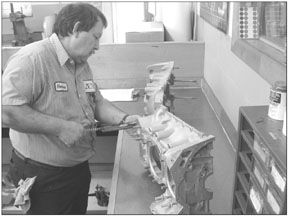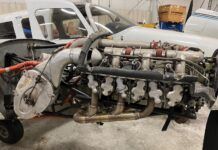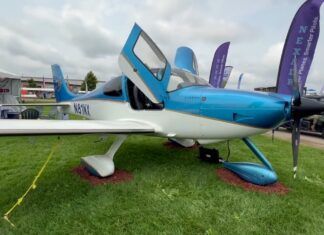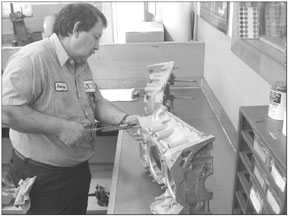
by Paul Bertorelli
Buying an engine overhaul is a scary proposition. A decent one costs a sum of money equivalent to a quarter or more of the airplanes value, you have make decisions about things you might know nothing about-which cylinders to use, for instance-and the blasted thing could tank or rust into junk a year after you signed the check to pay for it. (No one ever said owning an airplane is for sissies.)
Its not an exaggeration to say that when you buy an overhaul, you abandon yourself-and your wallet-to the tender mercies of the shop doing the work. It therefore pays to pick the shop wisely, read the fine print and find out what kinds of experiences other owners have had with the shop you have in mind.Obviously, you don’t have time to do all of that, so thats where we come in.We periodically survey the universe of airplane owners to ask about experiences with products and services, engine overhauls among them. Herewith are our latest findings.
How We Surveyed
Our latest report is the most complete survey of engine shop experiences weve ever compiled. Beginning in December 2004, via e-mail and announcements on our sister online publication, www.avweb.com, we invited readers all over the world to complete a 26-item questionnaire about their experiences with engine overhaul shops and the two factories, Lycoming and Continental. We asked how much the overhauls cost, what the warranties entailed, what kind of cylinders were used, whether there were any warranty claims, even what kind of oil was used in the engine. All of this leads to the bottom line question: Would you use the shop again and would you recommend it to a friend?
Altogether, we heard from 261 owners commenting on more than two dozen shops. We compiled sufficient data to rate 20 of these shops and the results are tabulated at right, with a price comparison on select engines from the top-rated shops on page 6. We asked survey participants to give us a warts-and-all description of their experiences with each shop and thats what we got, with glowing reports at one end of the spectrum and raging brickbats at the other, with everything in between.
We tabulated these responses by rating only those shops about which we received at least three replies. A number of shops got a single mention-some positive, some negative-but our view is that this isn’t sufficient data to make a fair judgment, even though those shops may be terrific sources of overhauls.
For our top shop criteria, we raised the bar to at least six replies with a customer satisfaction rating of at least 75 percent. Why 75 percent? If any business can satisfy more than seven out of 10 customers, we think its doing things mostly right. For those shops which do high volume-say 300 to 500 engines a year-we think its quite an achievement to produce products that satisfy eight to 10 customers with few or no complaints, especially in a world where customer service across a range of products varies from mediocre to flat-out abysmal.
Our customer satisfaction rating was calculated thusly: Owners were asked to rate the likelihood of returning to that shop or recommending it and given five choices: absolutely, probably, consider it, not likely and no way. Each of the first four choices were assigned five through two points respectively, with no way earning zero points. We totaled up the points for each shop and divided it by the maximum possible points the shop could have received, which was all the answers in the absolutely column. This percentage yielded the satisfaction rating.A disclaimer here. The top five shops earned that rating because we heard from at least six of their customers. But the next five shops-see the chart above-could have just as easily been top-rated had we heard from two more customers. On the other hand, those two customers might have been the unhappy ones. Perfect scores in the engine business are elusive, at best.
The Best Engine?
Based on this survey, who builds the best engines? We can categorically say no one and everyone. In other words, we don’t think the question can be answered and its probably the wrong question to ask anyway. The better way to frame the query is to ask who provides the most satisfying customer experience? Now were getting somewhere.
A positive customer experience is one of those maddening buzzwords the marketing guys in the expensive suits like to use at client meetings and although its impossible to define, customers know it when they see it. Shops that answer the phone and return calls, provide accurate quotes, deliver the engine as promised and on time and, above all, tend to warranty issues quickly without complaint, generate positive customer feedback. Those that don’t, don’t. Its that simple.
Although it shouldnt be difficult for a shop to perform these basic functions, it evidently is because not all of them are doing it. And many shops that prove a standout with one customer are a complete strikeout with the next. Consistent customer service performance day in and day out appears to be the formula for success and the fierce customer loyalty that gives a shop a top rating.
In praising Zephyr Engine, Piper Comanche owner Michael Mittman told us, Zephyr did a fine job, answered all my questions, made recommendations as to what added value to replace or overhaul and what was a waste of money should a component test okay. Not to mention the engine has been performing flawlessly. I am very satisfied.
But what if the engine had cratered 500 hours into its run? Would Mittman still have been singing Zephyrs praises? In all likelihood, yes, because a common theme among owners who rated these shops highly is confidence in after-the-sale support. They made good on a warranty item that was technically beyond warranty, said Piper Dakota owner Rich Adams of Penn Yan Aero. They also have answered many questions quickly and helpfully and these questions have included subsequent AD items. We could not be more pleased.
One underlying theme our survey revealed is how savvy owners are about poor quality control from both Continental and Lycoming and how fully cognizant they are of how a good shop takes up the slack when the owner gets stuck with junk parts or accessories. Said Cessna 210 owner Philip Weymouth, Jr., Someday, somebody will make cylinders like the ones in my original engine back in 1980. God knows that RAM and Western Skyways cant be faulted in trying make silk out of a sows ear. As to alternators, Im about to try pedal power.
Bad Raps and Warranty
Although we hear horror stories about engines gone bad and shops disconnecting telephones and absconding into the night, our survey reveals that this doesnt seem to happen too often, although it happens often enough. A shop has to do everything right to earn a top customer loyalty rating, but owners seem to give many of them the benefit of the doubt with a mediocre grade rather than the dreaded Id-never-go-there-again-on-a-bet report. Altogether, 25 respondents-about one in 10-said never again when asked if theyd go back to the shop where they bought the engine, another 11, or 4 percent, said not likely.
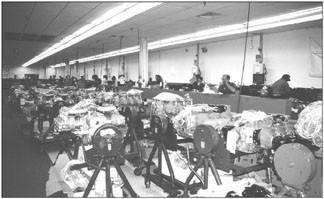
The Continental factory and Lynns in Mohave Valley, Arizona generated the most no way responses but, to be fair, Continental is also the volume leader, with its attractively priced factory reman program. The Lycoming factory netted two no ways in 16 survey responses. Of the top shops, only Teledyne Mattituck had a negative response for reasons the owner didnt stipulate.
We also asked how common warranty claims were and how the shops perform on these claims. Not too surprisingly, warranty claims of some type are not infrequent but they arent everyday events, either. Less than half-121 buyers-said they had no warranty claim, while the remainder reported that they had warranty work of some kind done, some minor, some major. But don’t take that to mean half of all engines require warranty work. In reality, half the universe of our survey group had warranty experience and thats not the same as all engine buyers.
We asked readers to rate the quality of warranty response on a scale of one to five. The overall survey average was a relatively encouraging 4.1 but, of course, this varies by shop. For example, the survey showed that top-rated Lycon had three warranty claims, all rated five. Survey takers reported seven warranty claims on Continental engines, with an average grade of three.Lycoming fared much better, with only four warranty claims in 16 responses for an average grade of 4.2; better than the survey average as a whole.
Among the top shops, Zephyr matched Lycon with a perfect five on warranty performance, followed by Poplar Grove with 4.6, Mattituck with 4.4 and Penn Yan with 4.3. Western Skyways rated below average at 3.75, but it had among the fewest warranty claims of any the shops in the survey.
The Factory Blahs
Youd think that with their considerable resources and economic advantages, Lycoming and Continental could generate customer loyalty with low prices and high quality. After all, they make the engines, not just overhaul them. But over the years, that hasnt proven to be the case. For example, both of the factories rate below the top shops in terms of overall customer satisfaction, with just under seven in 10 customers saying they would buy another factory engine.
We think the reason is fairly simple: lack of personal touch. Yes, the prices are good, delivery dates are kept and the engines seem to perform acceptably we’ll and, in some cases, exceptionally well. And the factories do have their loyalists. I like the quality and fit of the factory reman. They did a great job and the engine has performed beautifully, said Greg Burnett, who bought a Lycoming reman for his Cessna 172 in 2000. Yet…even with that praise, Burnett said he would probably go back to Lycoming. Would that be an absolutely if the engine were from Penn Yan or Poplar Grove or any of the top shops? The survey results suggest that it might have.
A number of owners were and remain steamed at Lycoming for its massive crankshaft recall and recent core charge policies (see Aviation Consumer, January 2005) and at Continental for ongoing quality control issues. Ive replaced two cylinders in 1100 hours, said Jeffrey Guttenberger of the IO-550 he bought from the Continental factory for his Bonanza. I cant understand why TCM cylinders prematurely lose compression. It seems to be a recurring TCM problem.
Some readers were more… ummm, animated in their description of factory engines. And they have long memories. I would go to some drunken shade tree mechanic before I would trust anything from Continental, especially after they assembled an engine improperly and refused to do anything about it, one respondent said of an O-200 he bought from the factory in 1995.
A Cessna 182 owner complained that his factory reman had a defective piston, with no breather holes milled in the oil ring groove, something the factory should have picked up during the engines test run. That engine, an O-470, was bought in 1999.
In our view, blame sticks to the factories like dried snot on a doorknob, even when they may not deserve it. This appears to be partly due to perceived-and real-quality control shortcomings in parts and what is characterized by many owners as stingy warranty performance. Lycomings warranty is too short. They have improved it, but it still remains short compared to the competition, writes Richard Hughes, who bought a factory overhaul for his Piper Warrior in 1997.
Further, owners complain that factory representatives-both Lycoming and Continental-are slow to return calls and letters and too frequently don’t return them at all. Lycoming, for instance, spent a massive sum of money in support of owners during the crankshaft recall two years ago. Although most owners concede it did the right thing, it earned only grudging approval, according to our surveys, because of poor communication with customers.
Conclusions
What conclusions can we draw from our survey? The overarching finding is this: Buying an engine is less about how good the engine is and more about how the shop responds when things don’t go as planned. Most post-sale warranty issues are minor, niggly things like oil leaks, log entries and accessory issues but, nonetheless, buyers have a right to expect them to be fixed. We don’t think any of the shops have a lock on the claim to making the best engine. We think some can clearly claim to provide the best customer experience and those are listed in our top five.
Thats not to say we wouldnt recommend shops such as Americas Aircraft Engines in Tulsa or Certified Engines in Opa Locka, Florida, both of which finished out of the top five merely because we received fewer responses from buyers. In our view, this is a statistical fluke that should in no way reflect poorly on any shop with a satisfaction rating in the 70th percentile or higher.
On the other hand, it speaks we’ll of the top shops that customers are enthusiastic enough about their experience with these businesses to take part in our survey and to heap praise upon the shops in the process. The tarnished other side of that coin is that when a shop really torques off customers-and some seem good at it-theyll remember it and they wont be shy about unloading on the shop when asked in our surveys.
In picking a shop, bear in mind that the engine overhaul business exists in a national market. Its possible to ship an engine from California to Florida or New York for an overhaul or vice versa. Were not sure that makes sense, however, given the fact that every part of the country has a highly rated shop within regional distance. We think its more advisable to pick the best, closest shop.
Why? Warranty performance and turn-around time. Shipping adds a few days to a week in whats already a six-week turn around for the typical engine change. Some owners like to look in on their engine while its being built up. I like that the overhaul was done in my local shop, so I can decide, for example, to install new cylinders, wrote one reader.
While the best shops are willing and capable of doing warranty work by remote control, there’s a distinct advantage to flying the airplane to the shop in question. Its usually easier and faster and, in our view, youre more likely to be given the benefit of the doubt on gray-area warranty questions. And remember, youre buying not just an engine, but a favorable customer experience and this is often translated by seamless warranty performance.
Even though the factories don’t fare as we’ll in this survey as field shops do, were not suggesting or recommending that you not buy a factory overhaul or reman. In some instances, the better field shops will steer you in that direction if they know the economics are simply better for the customer. Just know that the warranty performance may not be as good and you are unlikely to get the kind of brother-in-law deal that a shop youve dealt with for years will probably provide.
Also With This Article
“Checklist”
“Top Shops Survey”
“Other Shop Ratings”
“Selected Overhaul Price Comparison”
“Engine Prices: Sharply Higher”

